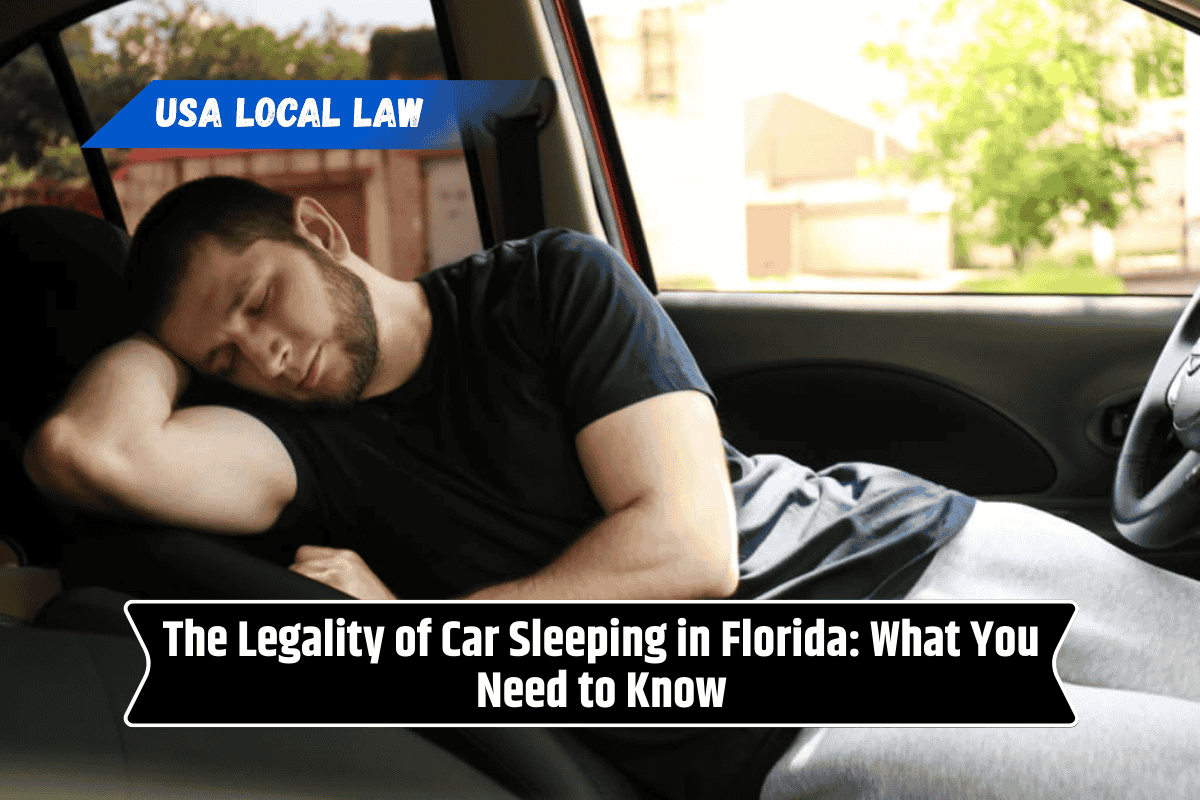In Florida, sleeping in your car might seem like a simple solution—especially for road trippers, truck drivers, or people in temporary need. But the legality of this action depends on where you park, how long you stay, and local city or county laws.
This guide will help you understand when and where it’s legal to sleep in your car in Florida in 2025.
Is Sleeping in Your Car Legal in Florida?
There is no statewide law in Florida that makes sleeping in your car illegal. However, the issue depends largely on local laws, the location where you park, and the time of day.
In general, sleeping in your car is allowed if:
You are not on private property without permission.
You are parked in a legal, public area.
You are not breaking any local ordinance or creating a public disturbance.
But even if it’s not illegal statewide, you can still get into trouble if you park and sleep in the wrong place.
Where Can You Legally Sleep in Your Car in Florida?
Here are some places where sleeping in your car is usually allowed in Florida:
Rest Areas
Florida allows people to stop at highway rest areas. You can stay for up to 3 hours, according to Florida Department of Transportation (FDOT) rules. Some areas may allow overnight parking, but they are meant more for short breaks than full overnight stays.
Truck Stops and Travel Plazas
Places like Pilot, Love’s, or TA usually allow people to rest in their vehicles, especially for truckers and long-distance travelers. It’s still a good idea to check inside the store or gas station for any posted rules.
Campgrounds and RV Parks
If you’re sleeping in a car for camping purposes, you can legally stay overnight at campgrounds, state parks, or RV parks—but only if you pay the required fees and follow the rules.
Walmart and Some Other Store Parking Lots
Many Walmart locations have been known to allow overnight parking. However, this is not a company-wide policy. Some Florida Walmarts (especially in cities) do not allow car sleepers. Always check with the store manager.
Where Is It Illegal or Risky?
Residential Streets
Parking overnight in a residential area can attract police attention. Many towns and cities in Florida have local rules that ban overnight parking or sleeping in cars on residential streets. You might receive a warning, fine, or even be asked to move immediately.
Beach Parking Lots or Parks
Most beachside parking areas in Florida close at night and post signs about “No Overnight Parking.” Sleeping in your car at the beach can get you fined or towed.
Private Property
Sleeping on private property—like a business or apartment lot—without permission can be considered trespassing. You could face legal trouble even if you’re just napping.
What About Homelessness and Sleeping in Cars?
For some people, sleeping in a car is not a choice but a necessity. Unfortunately, several cities in Florida, like Miami and Orlando, have laws or ordinances that criminalise sleeping in public—including in vehicles.
In such areas, sleeping in your car can lead to fines, warnings, or even arrest under certain conditions. Some cities are working on more compassionate approaches, but the law is still strict in many places.
Tips to Avoid Trouble While Sleeping in Your Car
Check signs around you: Look for “No Overnight Parking” or “No Loitering” notices.
Ask permission: If you’re in a store or lot, ask the manager before settling in.
Avoid drawing attention: Keep lights off, limit movement, and park in well-lit, legal spaces.
Have ID ready: If approached by police, be polite and show identification.
Plan ahead: Use apps or maps to find rest stops, camping areas, or overnight-friendly parking spots.
In Florida, sleeping in your car is not automatically illegal, but it depends on where and how you do it. The best approach is to stay informed, obey local parking signs, and avoid private property unless you have permission.
Always remember that different cities may have their own rules, and breaking them can lead to fines or other trouble.
If you’re using your car as temporary shelter, consider reaching out to local services or shelters that may offer support. Understanding the local laws will help you avoid problems and stay safe while on the road or in a tough spot.
